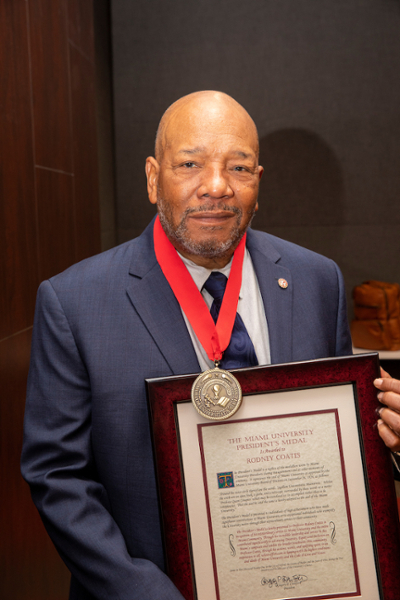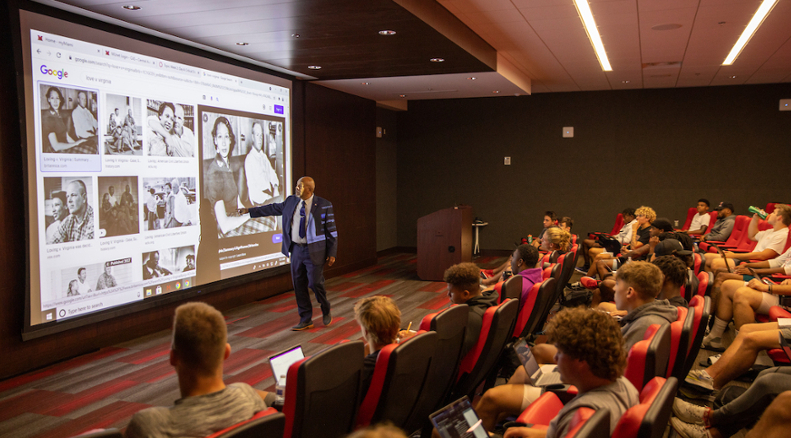

Professor Rodney Coates awarded the President's Medal
More about the President's Medal awarded to Coates
The President’s Medal is a replica of the medallion worn by Miami University presidents during inaugurations and at other moments of ceremony. It represents the seal of Miami as approved by the Miami University Board of Trustees on Sept. 26, 1826.
The plaque presented to Coates states: “Through his incredible leadership and service he has contributed significantly to advance Diversity, Equity and Inclusion on Miami’s campuses and within the broader Southwest Ohio community.
“Professor Coates, through his actions, words and uplifting spirit, is an inspiration to all, whose efforts are in keeping with the highest traditions and ideals of Miami University and the Code of Love and Honor.”
By Margo Kissell, university news and communications
Rodney Coates was teaching 30 student-athletes about critical race theory when Miami University President Gregory Crawford walked into the classroom.

Rodney Coates
The president was there to award the President’s Medal to Coates, a professor of critical race and ethnic studies in the department of global and intercultural studies, “in recognition of his extraordinary service to Miami University and the entire Miami Community,” a plaque accompanying the medal states.
President Crawford chose the classroom setting on July 8 because he knows how much the class means to Coates, who helped build the Summer Bridge Program credited with driving up student-athlete GPAs.
“Professor Coates has always been there for us. No matter what it was, no matter what I asked the last five years, he was always rolling his sleeves up, just to get it done, because he loves the university, and he loves what he does,” the president told the student-athletes and others who gathered inside the Randy Gunlock Family Athletic Performance Center next to Yager Stadium. “That inspires us all, and the President’s Medal is to recognize that.”
The president highlighted Coates’ “unbelievable energy and enthusiasm” surrounding the university’s diversity, equity and inclusion efforts.
“He pushed us forward,” he said. “He had great ideas so that we could elevate everybody and be a more inclusive place.”
The president also mentioned Coates’ involvement in the inaugural Mid-American Conference’s Transformative Leadership Badge Program last year. He and two other Miami colleagues led three, two-hour sessions on diversity, equity and inclusion for 225 student-athletes. One participant who was interviewed afterward appreciated how Coates made it “an easy environment for everyone to talk in.”
More recently, Coates recorded a Juneteenth “Teach-in” lecture for the Miami community that breaks down the history of Juneteenth — America’s newest federal holiday, signed into law by President Biden on June 18. Coates’ expertise on the subject garnered national media attention from CBS News and New York Times Op-Ed columnist Charles Blow.
“It’s just extraordinary,” the president said.
Setting the bar
Coates, who has been at Miami for 32 years, made receiving the prestigious award a teachable moment for his students.

President Gregory Crawford presented Professor Rodney Coates with the President's Medal. Coates has been at Miami for 32 years (photos by Jeff Sabo.)
“I firmly believe the only free people in America are those who set the bar,” he said. “My job is to set the bar.” He added, “I’m here because of the president, the AD (athletic director), the coaches and this whole team effort of coming together to make this institution a tradition of excellence. That’s why I’m here, that’s what I do, and I thank you very much, sir, for the honor.”
Director of Athletics David Sayler told the student-athletes that while Coates’ class is known to be challenging, every junior and senior student-athlete he talks to says “this is the best class they’ve ever had. It impacted them to a greater level than any other class, and that’s a testament to this man and all the work he puts in.”
Coates resumed teaching the class after the break as the students munched on pizza for lunch. Outside the room, Football Coach Chuck Martin said the Summer Bridge Program — which he described as a “six-week crash course on getting prepared for college” — was the vision of Coates and Craig Bennett, now senior director of the Student Success Center.
“It doesn’t matter where you went to high school, going to Miami University and taking classes here is going to be different and more challenging,” Martin said.
Martin pointed out that Coates stresses critical thinking skills and doing research.
“During the class, in little pieces, they’re putting together this 35-page research paper,” he said. “He talked in there about raising the bar, that’s what he does with all of these students.”
Outside linebacker Daylan Long, a first-year student from Cincinnati, said he likes Coates’ straight-forward style, which carries over into the classroom. He also appreciates Coates’ perspective. “It’s a lot of work, but he’s just preparing us for better.”
Defensive end Terran Hearn, a first-year student from Louisville, Kentucky, already sees how the class will help him become a stronger student. “Every day we have discussion questions, and every week we have a paper.”
